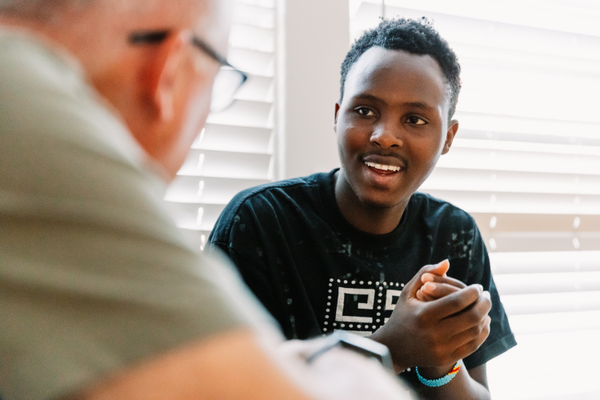Provide a home to children in need of safety and solace
Provide a home to children in need of safety and solace

Children are on the move
Today, 108.4 million people have been forcibly displaced from their home due to persecution, violence, conflict, famine, and natural disasters. Children represent 40% of all people seeking safety.
Children who arrive in the U.S. without any family or family friends may be placed in long-term refugee and immigrant foster care. When family reunification is not possible, the best option is to be cared for by a foster family until they reach early adulthood.
Foster families provide a safe, loving home for refugee youth, many of whom have been separated from their families for years.
FAQs about long-term refugee foster care
-
Many of the children come from Central America, but others come from the Democratic Republic of Congo, Afghanistan, Ukraine, Ethiopia, and Eritrea. They are between 13-17 years old, although most are 15 or older.
-
Yes. Bethany receives referrals each day for refugee children who need foster homes. We don’t have enough foster parents to accept all of these referrals. We need foster parents who want to open their hearts and homes to give kids an opportunity for a better life.
-
Unaccompanied refugee minors are not legally eligible for adoption. However, many refugee foster parents develop deep connections with refugee children they’ve cared for in their homes, considering them part of the family.
-
After fleeing their country of origin, the youth find a refugee camp or urban environment that can provide a small measure of safety, but conditions inside many camps are still dangerous. Services to children are minimal. Food rations are inadequate. And children are vulnerable to being trafficked.
When a child arrives in a refugee camp, the United Nations High Commission on Refugees (UNHCR) refers them to agencies that will assist them in searching for family. If the child cannot be reunified with a family member, the UNHCR refers the child for resettlement in a third country.
-
Education. Many of these kids have spent months fleeing and have lived in chaotic environments where educational opportunities were inconsistent or unavailable. They need foster parents who, along with their case manager, are willing to identify the educational services these kids need and help them with their homework as they begin to make up for the years of education they missed.
Trauma. Refugee children have often experienced incredible levels of trauma. Some have seen their parents, family members, and friends lose their lives. These children need foster parents who will help them feel safe, loved, and supported.
-
Most of the training is very similar, but you’ll experience additional, in-depth trauma training. We begin with two hours of orientation followed by 30 hours of training over five weeks.
During this training, youth and foster parents may share their stories. Hearing these stories puts all the information in context and helps you realize the difference you can make in a young person’s life.
-
- Attend a free information meeting.
- Get certified.
- Receive training to support your foster child, including trauma training.
- Placement occurs when you welcome a child into your home.
- On-going support is available to help you through it all.
- Successfully parent your foster child into adulthood.
-
Foster parents receive a monthly, tax-free stipend. While it varies by state, most foster parents report it covers necessary expenses like food, clothing, and school supplies. Foster children will receive Medicaid or another form of health insurance.
You’ll still discover additional out-of-pocket costs, which is why we recommend foster parents seek community resources and family support.
-
Foster parents can be single or married. Many are already raising children. Some have never parented before.
-
You need to be resilient, compassionate, and a good listener. You’ll be dealing with teens, trauma, and cultural differences. You’ll need to be patient and understanding as you help teens adjust to potentially unrealistic expectations of “life in America.” You’ll also need a sense of humor as you enjoy the experience of welcoming a child from another culture into your family!
-
You’ll receive a support team composed of a licensing specialist, case manager, therapists, and more. We want every placement to be successful for both the family and child, so we’ll work together to give you the support you need.
-
No. While bilingual parents make fantastic foster parents, it’s not required that you speak the same language as the children in your care. One of the biggest joys and challenges of refugee foster care is learning to connect with children from a different culture and language than your own. We provide specialized training and ongoing support to help refugee foster parents build bridges of understanding between themselves and the children in their care. This support includes access to translators and interpreters, as needed.
I Want To Learn More
Caring for refugee youth as a foster parent takes commitment, but it’ll be worth it. And we’ll walk alongside you every step of the way, providing training and support.
Long-term goals for refugee youth
As refugee youth work to heal from past trauma, they pursue goals of learning English, getting an education, and preparing for a future of independence.
It’s important to understand the trauma and losses many refugees have lived through and how you can help support them as they heal and rebuild their lives.
Remarkable stories of courage and resilience
Remarkable stories of courage and resilience
Got questions?
This is a big decision and it’s natural to have questions.
Connect with our team of experts to hear more about how you can help support children and families in your community.
